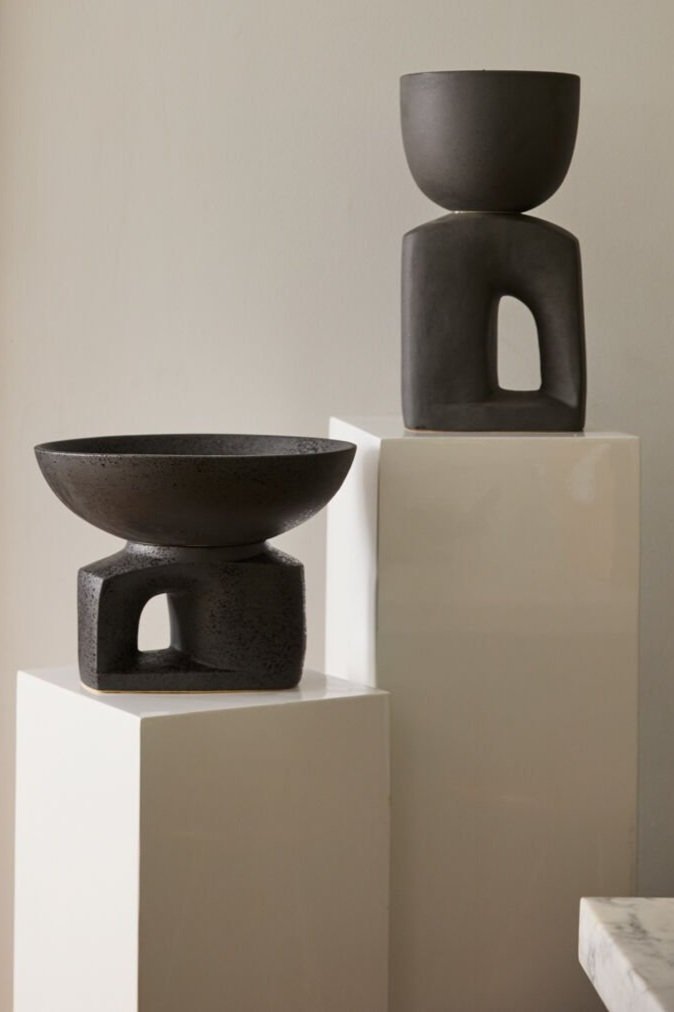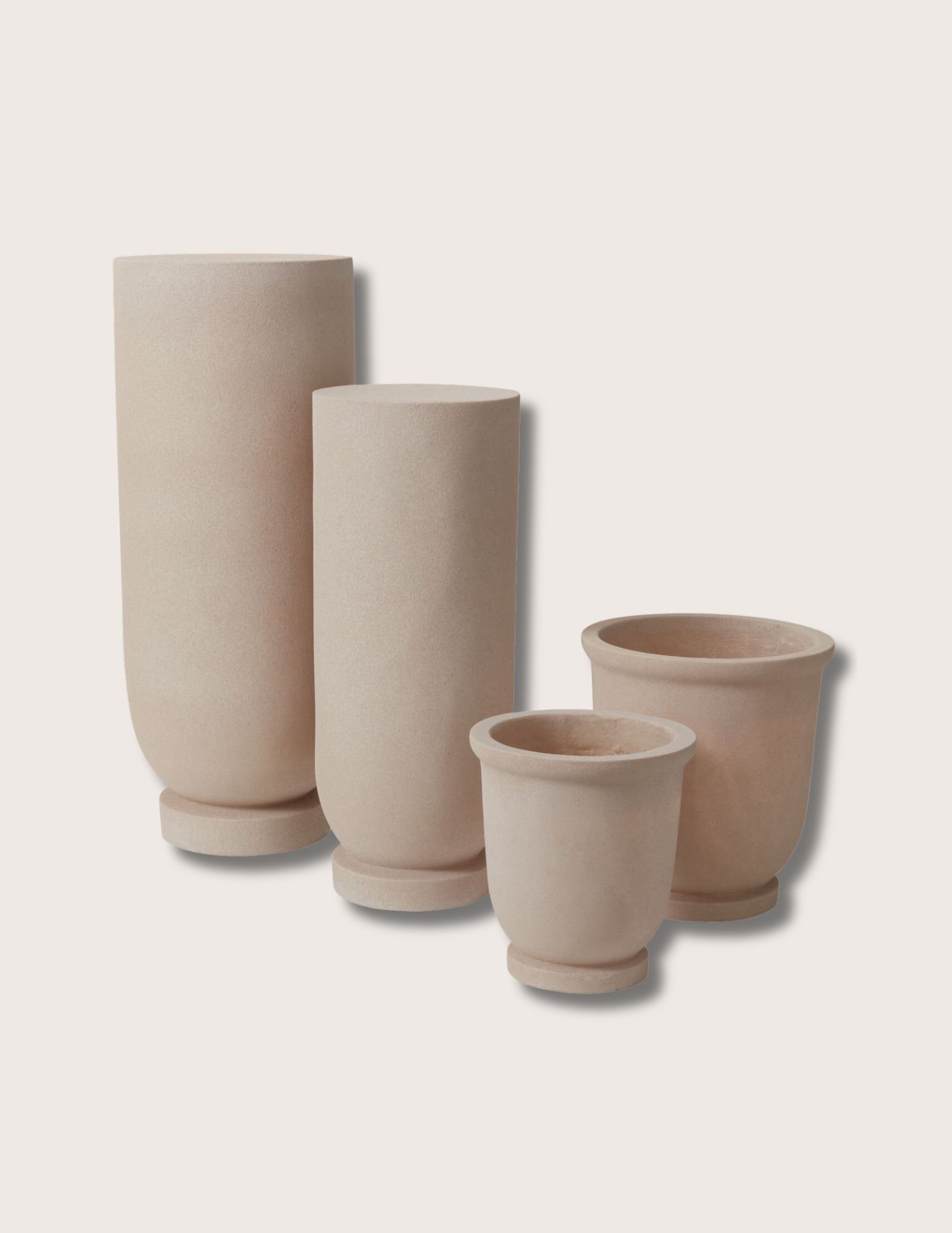 Image 1 of 3
Image 1 of 3

 Image 2 of 3
Image 2 of 3

 Image 3 of 3
Image 3 of 3




Josephine Footed Bowl
Details
The thoughtful design of the ceramic Josephine Footed Bowl offers endless creative possibilities, whether used as a decorative centerpiece, floral vessel, or planter. This versatile, watertight, uniquely shaped bowl features an open foot to support long stems, wide handles for modern flair, and alternating glossy and matte stripes on the natural white clay. With its neutral colors and interesting shape, this bowl adds eye-catching dimension to any space. Pair it with the Josephine Vase for a complete look.
Editors' Note
Named for international star of stage and screen, Josephine Baker, Baker was revered for bravery shown as a spy for the Allies in WWII, and remembered as the first Black woman to head a major motion picture. Baker was a tireless advocate for equality and civil rights. So much so, that her dedication and vitality to the cause spurred Coretta Scott King to approach her to lead the Civil Rights Movement in the wake of Martin Luther King Jr’s assassination in 1968. Notwithstanding the acclaim that she would eventually receive in France and elsewhere, Baker’s firsthand knowledge of the horrors of American racism went back to her earliest days in Missouri, where she witnessed the burning of African American homes by white rioters. Forced to work as a live-in domestic for white families as a child — and facing abuse from many of them — Baker, born Freda Josephine McCloud, eventually lived on the street. Married twice before she was 16 — the second time to William Howard Baker, whose name she would take onstage — both marriages had ended by the time Baker moved to Paris at 19. Once in France her career was the stuff of history and legends, yet Baker famously commented that while she had been welcomed at the palaces and homes of royalty and state leaders, she could not walk into an American hotel for a cup of coffee. Indeed, upon returning to the US on tour in 1951, the international star and war hero was refused accommodation by dozens of hotels. She wrote extensively on the experience, in particular criticizing gossip columnist Walter Winchell for failing to come to her defense during an incident at Manhattan’s Stork Club. During a lengthy feud in the press, Winchell — previously an advocate for both Baker and Civil Rights — responded with allegations of Communism and pro-Fascism, involving the FBI in having Baker’s tour and visa cancelled, and forcing her return to France. Yet, prior to that she was already making waves for refusing to perform during the tour for segregated audiences — a policy which forced several venues to integrate their halls rather than risk losing her as a performer. Consequently, in the same year, she was honored by Ralph Bunche and the NAACP, which declared May 20th, 1951 to be Josephine Baker Day. Later in 1963, she would be the only woman on stage as a featured speaker during the March on Washington. The culmination of a lifelong commitment to justice, Josephine took to the stage just before MLK changed the world with the words, “I Have a Dream.” In her brief speech she talked about being burned out of her home as a child and running away to France, the strangeness of being more kindly treated there and the blows and repeated indignities of her return to America, and of learning, through it all, to see beyond herself and find her people. “I am not a young woman now, friends,” she said, “my life is behind me. There is not too much fire burning inside me. And before it goes out, I want you to use what is left to light that fire in you…You know I have always taken the rocky path…I took that rocky path, and I tried to smooth it out a little. I wanted to make it easier for you. I want you to have a chance at what I had. But I do not want you to have to run away to get it.”
Details
The thoughtful design of the ceramic Josephine Footed Bowl offers endless creative possibilities, whether used as a decorative centerpiece, floral vessel, or planter. This versatile, watertight, uniquely shaped bowl features an open foot to support long stems, wide handles for modern flair, and alternating glossy and matte stripes on the natural white clay. With its neutral colors and interesting shape, this bowl adds eye-catching dimension to any space. Pair it with the Josephine Vase for a complete look.
Editors' Note
Named for international star of stage and screen, Josephine Baker, Baker was revered for bravery shown as a spy for the Allies in WWII, and remembered as the first Black woman to head a major motion picture. Baker was a tireless advocate for equality and civil rights. So much so, that her dedication and vitality to the cause spurred Coretta Scott King to approach her to lead the Civil Rights Movement in the wake of Martin Luther King Jr’s assassination in 1968. Notwithstanding the acclaim that she would eventually receive in France and elsewhere, Baker’s firsthand knowledge of the horrors of American racism went back to her earliest days in Missouri, where she witnessed the burning of African American homes by white rioters. Forced to work as a live-in domestic for white families as a child — and facing abuse from many of them — Baker, born Freda Josephine McCloud, eventually lived on the street. Married twice before she was 16 — the second time to William Howard Baker, whose name she would take onstage — both marriages had ended by the time Baker moved to Paris at 19. Once in France her career was the stuff of history and legends, yet Baker famously commented that while she had been welcomed at the palaces and homes of royalty and state leaders, she could not walk into an American hotel for a cup of coffee. Indeed, upon returning to the US on tour in 1951, the international star and war hero was refused accommodation by dozens of hotels. She wrote extensively on the experience, in particular criticizing gossip columnist Walter Winchell for failing to come to her defense during an incident at Manhattan’s Stork Club. During a lengthy feud in the press, Winchell — previously an advocate for both Baker and Civil Rights — responded with allegations of Communism and pro-Fascism, involving the FBI in having Baker’s tour and visa cancelled, and forcing her return to France. Yet, prior to that she was already making waves for refusing to perform during the tour for segregated audiences — a policy which forced several venues to integrate their halls rather than risk losing her as a performer. Consequently, in the same year, she was honored by Ralph Bunche and the NAACP, which declared May 20th, 1951 to be Josephine Baker Day. Later in 1963, she would be the only woman on stage as a featured speaker during the March on Washington. The culmination of a lifelong commitment to justice, Josephine took to the stage just before MLK changed the world with the words, “I Have a Dream.” In her brief speech she talked about being burned out of her home as a child and running away to France, the strangeness of being more kindly treated there and the blows and repeated indignities of her return to America, and of learning, through it all, to see beyond herself and find her people. “I am not a young woman now, friends,” she said, “my life is behind me. There is not too much fire burning inside me. And before it goes out, I want you to use what is left to light that fire in you…You know I have always taken the rocky path…I took that rocky path, and I tried to smooth it out a little. I wanted to make it easier for you. I want you to have a chance at what I had. But I do not want you to have to run away to get it.”

Additional Details
Single vase
Weight: 10.5 lbs
Material: Ceramic
Opening Size: 9.5"
Dimensions: 16.25” x 16.25” x 8.5”
Made to order
Ships within the continental US in 3-4 weeks











